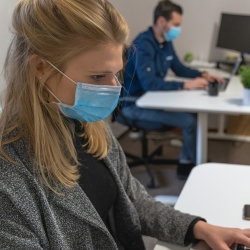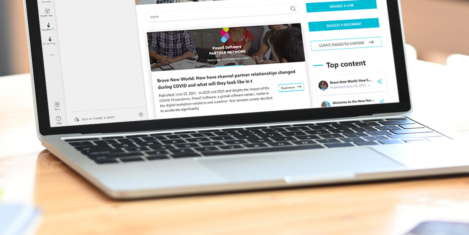November 18, 2021
Search Results for: productivity
November 16, 2021
Powell Software launches Together to allow SMEs to connect and collaborate with ease
by Freddie Steele • Company news
 As SMEs (small and medium-sized enterprises) grapple with a myriad of challenges to keep their companies running successfully, Powell Software introduces Together, the small business intranet accessible from Microsoft Teams that helps meet their productivity, communication and collaboration needs. (more…)
As SMEs (small and medium-sized enterprises) grapple with a myriad of challenges to keep their companies running successfully, Powell Software introduces Together, the small business intranet accessible from Microsoft Teams that helps meet their productivity, communication and collaboration needs. (more…)
November 15, 2021
Toxic workplace culture impacting the mental health of almost half of workforce
by Neil Franklin • News, Workplace
 Two in five employees across the UK have experienced problematic behaviour, such as bullying, harassment or discrimination at work; with 42 percent confirming toxic workplace culture has impacted their mental health, according to research from Culture Shift. The study (registration) also claims over one third have felt silenced on issues that matter to them in the workplace, while 29 percent have taken time off due to an incident that happened at work, such as bullying, harassment, discrimination or sexual misconduct. A further 41 percent confirmed bad workplace culture has impacted their productivity and 42 percent have previously left a job due to negative workplace culture. (more…)
Two in five employees across the UK have experienced problematic behaviour, such as bullying, harassment or discrimination at work; with 42 percent confirming toxic workplace culture has impacted their mental health, according to research from Culture Shift. The study (registration) also claims over one third have felt silenced on issues that matter to them in the workplace, while 29 percent have taken time off due to an incident that happened at work, such as bullying, harassment, discrimination or sexual misconduct. A further 41 percent confirmed bad workplace culture has impacted their productivity and 42 percent have previously left a job due to negative workplace culture. (more…)
November 12, 2021
Hybrid working could save the NHS more than £4 billion per year
by Jayne Smith • Flexible working, News, Wellbeing, Working lives
 Hybrid working could save the NHS more than £4 billion per year by giving workers more time to look after themselves and their families, according to a new study by Virgin Media O2 Business and the Centre for Economics and Business Research (Cebr). (more…)
Hybrid working could save the NHS more than £4 billion per year by giving workers more time to look after themselves and their families, according to a new study by Virgin Media O2 Business and the Centre for Economics and Business Research (Cebr). (more…)
November 11, 2021
Going with the flow in the way we work
by Mark Eltringham • Features, Workplace design
Throughout history we’ve been aware of the state we now refer to as flow. It describes the sensation of existing purely in the moment of some activity, effortlessly achieving what we have set out to achieve and unaware of distractions. Mystics have described it as ecstasy, artists as rapture and athletes as in the zone. This state was first described as flow by the Hungarian psychologist Mihály Csíkszentmihályi in 1975 and has been developed by him and a wide range of other researchers in a number of fields since that time.
The essential characteristic of flow is an individual’s total and enjoyable absorption in an activity to the point that they lose a sense of space and time. It is related to focus but it is not the same. Flow is a state of transcendence and it is just as important in office design as any other domain of human activity.
The idea has been widely talked about as a desirable state in which to complete work, especially creative tasks. Indeed, the idea of heightened states while engaged in tasks predates the work of Csíkszentmihályi. Perhaps the best-known organisational psychologist of all time Abraham Maslow coined the term peak experience to describe intensely joyous and exciting moments. In these moments, we feel more whole, integrated, aware of ourselves and deeply happy. Maslow described them as those “moments of highest happiness and fulfilment” in his 1964 work Religions, Values, and Peak Experiences. He linked them to the idea of self-actualisation from his famous Hierarchy of Needs.
Flow is more common at work
Such moments are more likely when we are at work than in other periods of our lives and are relatively common. According to an article by Csíkszentmihályi published in Psychology Today, in a survey of 6,469 Germans, when asked how often they entered a flow state: 23 percent said often; 40 percent said sometimes; 25 percent said rarely; and 12 percent said never or don’t know.
[perfectpullquote align=”right” bordertop=”false” cite=”” link=”” color=”” class=”” size=””]Organisations should seek to develop activities, cultures and environments that make it easier for people to enter flow states[/perfectpullquote]
His own research using more objective methods found that work was better suited to the creation of flow states than passive activities such as watching television, leading him to conclude that ‘work is much more like a game than most other things we do during the day. It usually has clear goals and rules of performance. It provides feedback either in the form of knowing that one has finished a job well done, in terms of measurable sales or through an evaluation by one’s supervisor. A job tends to encourage concentration and prevent distractions, and ideally, its difficulties match the worker’s skills.’
Csikszentmihályi argues that organisations should seek to develop activities, cultures and environments that make it easier for people to enter flow states in their work. This isn’t just about making them more productive and more likely to have good ideas, although those are two of the most important outcomes. In his 2003 book Good Business: Leadership, Flow, and the Making of Meaning, Csikszentmihályi argues that fostering flow states improves morale by creating a sense of greater happiness and accomplishment. He looks at how flow states are essential for the creation of ‘good work’ in which you enjoy the feelings of “doing your best while at the same time contributing to something beyond yourself.” He also highlights the importance of regular feedback as an essential ingredient for the fostering of flow states.
For this reason, flow is not just an important goal for the individual. Because it contributes to organisational goals such as higher productivity, better ideas and improved morale, it can improve the overall performance of the organisation and encourage greater collaboration.
Csikszentmihályi concludes that there are three conditions for the creation of flow states at work:
• One must be involved in an activity with a clear set of goals and progress. This adds direction and structure to the task.
• The task at hand must have clear and immediate feedback. This helps the person negotiate any changing demands and allows them to adjust their performance to maintain the flow state.
• One must have a good balance between the perceived challenges of the task at hand and their own perceived skills. One must have confidence in one’s ability to complete the task at hand.
Designing for flow
There are several characteristics of an office environment that can encourage flow states and meet these prerequisites. The ability to focus and work free from distraction is perhaps the most obvious, but so too are the creation of an enjoyable working culture, strong bonds with colleagues, immediate feedback on tasks, an affinity with each job and regular communication with colleagues.
This demands a sophisticated and intelligent approach that embraces a number of features of office design. The most progressive office design concepts seem ready-made to deliver a working environment that can encourage flow states. By empowering people to work in ways that suit them best with a choice of work styles and offering the sorts of spaces in which people can enter flow states undisturbed, such offices increase the likelihood of flow. This principle of office design aligns completely with the characteristics of flow states.
In addition, the democratic structure of the space makes feedback significantly more likely, while the social spaces, collaborative space and more playful aspects of the design encourage people to be aware of ‘something greater than themselves’.
November 11, 2021
Parents are less productive when they feel childcare eats into work-time
by Jayne Smith • Flexible working, News, Working lives
 Parents who feel shame about childcare responsibilities eating into their work-time are less productive when they are working than those who do not feel ashamed, according to new research by Durham University Business School. (more…)
Parents who feel shame about childcare responsibilities eating into their work-time are less productive when they are working than those who do not feel ashamed, according to new research by Durham University Business School. (more…)
November 11, 2021
Majority of employees lack confidence in their company’s return-to-work strategy
by Jayne Smith • News, Wellbeing, Working lives
 Humanyze has released the second installment of the 2021 Future of Work Report, a holistic analysis of the evolution of work throughout the pandemic and employee sentiments about the post-pandemic future of the workplace. Nearly 2,300 survey responses were collected from individual employees and people managers, and compared to responses from the spring 2021 report, to identify key changes over the last 6 months. (more…)
Humanyze has released the second installment of the 2021 Future of Work Report, a holistic analysis of the evolution of work throughout the pandemic and employee sentiments about the post-pandemic future of the workplace. Nearly 2,300 survey responses were collected from individual employees and people managers, and compared to responses from the spring 2021 report, to identify key changes over the last 6 months. (more…)
November 11, 2021
Over half of UK employees believe AI skills will make their job easier
by Jayne Smith • News, Technology, Working lives
 According to new global research from ABBYY, six-in-ten (64 percent) UK employees say their job is made more difficult through trouble accessing data in documents and one-in-four (27 percent) lose a full day of productivity per week searching documents for information they need to serve customers, higher than the global average. (more…)
According to new global research from ABBYY, six-in-ten (64 percent) UK employees say their job is made more difficult through trouble accessing data in documents and one-in-four (27 percent) lose a full day of productivity per week searching documents for information they need to serve customers, higher than the global average. (more…)
November 10, 2021
2021 Digital Etiquette study highlights the rise of the invisible workforce
by Jayne Smith • Flexible working, News, Working lives
 The 2021 Digital Etiquette Study by Adaptavist, highlights that 43 percent of workers in the UK want to come back to the workplace/office full-time, while the exact same figure (43 percent) favour a flexible/hybrid model and 14 percent want to be remote only. However, as hybrid work increasingly becomes the long-term future for knowledge workers, Adaptavist suggests a growing despair among employees with the tools and technologies they are using to navigate working remotely with many left feeling invisible. (more…)
The 2021 Digital Etiquette Study by Adaptavist, highlights that 43 percent of workers in the UK want to come back to the workplace/office full-time, while the exact same figure (43 percent) favour a flexible/hybrid model and 14 percent want to be remote only. However, as hybrid work increasingly becomes the long-term future for knowledge workers, Adaptavist suggests a growing despair among employees with the tools and technologies they are using to navigate working remotely with many left feeling invisible. (more…)
November 10, 2021
New research provides insights into post-pandemic workplace
by Jayne Smith • Flexible working, Newsletter, Working culture
 The latest research from MRI Software, claims that commercial occupiers’ willingness to allow all employees the choice to work remotely fell dramatically from 39 percent to 26 percent between March and September 2021. Seventy percent of survey respondents planned to institute policies that tighten up remote work eligibility and onsite requirements – up from 60 percent in March. (more…)
The latest research from MRI Software, claims that commercial occupiers’ willingness to allow all employees the choice to work remotely fell dramatically from 39 percent to 26 percent between March and September 2021. Seventy percent of survey respondents planned to institute policies that tighten up remote work eligibility and onsite requirements – up from 60 percent in March. (more…)
November 8, 2021
Why real estate businesses can’t afford not to invest in sustainability
by Jayne Smith • Environment, News
 The World Green Building Council (WorldGBC), a global network accelerating sustainability and decarbonisation in the building and construction sector, has set out the updated value proposition to drive investment in a sustainable built environment by launching a new flagship report ‘Beyond the Business Case’ at COP26 in Glasgow. (more…)
The World Green Building Council (WorldGBC), a global network accelerating sustainability and decarbonisation in the building and construction sector, has set out the updated value proposition to drive investment in a sustainable built environment by launching a new flagship report ‘Beyond the Business Case’ at COP26 in Glasgow. (more…)
November 3, 2021
Recruitment drive sees majority of firms embed flexible working policies
by Jayne Smith • Flexible working, News, Working lives
 New research by Totum Partners, claims that the majority of firms now have hybrid working policies in place, as worker preferences and economy-wide recruitment pressures drive increased demand for flexible working. This includes 50 percent of firms which have implemented a company-wide policy, while the remaining 50 percent have published guidelines that can be interpreted by location or individual team. (more…)
New research by Totum Partners, claims that the majority of firms now have hybrid working policies in place, as worker preferences and economy-wide recruitment pressures drive increased demand for flexible working. This includes 50 percent of firms which have implemented a company-wide policy, while the remaining 50 percent have published guidelines that can be interpreted by location or individual team. (more…)








 More than half of young professionals (those aged 16-34), feel burnt out right now, according to new research exploring experiences of burnout pre and post pandemic from people analytics company,
More than half of young professionals (those aged 16-34), feel burnt out right now, according to new research exploring experiences of burnout pre and post pandemic from people analytics company, 



















